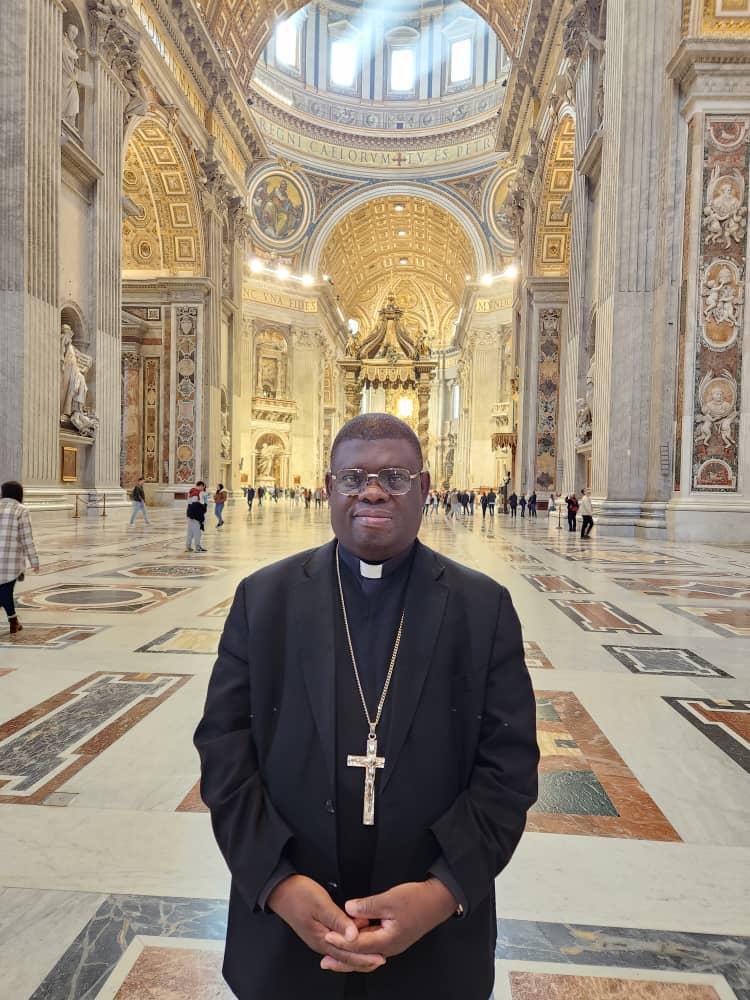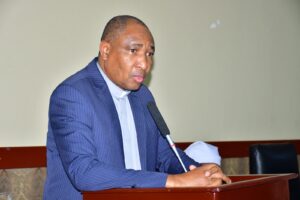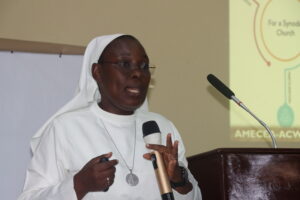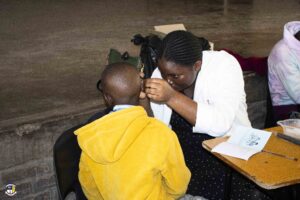AMECEA: Chairman on Clarion Call for Peace as South Sudan Hosts Sudanese Refugees

AMECEA Chairman Bishop Charles Sampa Kasonde of Solwezi Diocese, Zambia
Sr. Jecinter Antoinette Okoth, FSSA
Due to the ongoing war between Sudanese Armed Forces (SAF) and the paramilitary Rapid Support Forces (RSF) which has led to increased insecurity in Sudan, neighbouring countries of the war-torn nation are experiencing influx of refugees including South Sudan receiving returnees who had once fled the county and are coming back because of the hostile environment.
In an interview with AMECEA Online, the chairman of the Association of Member Episcopal Conferences of Eastern Africa (AMECEA) Bishop Charles Sampa Kasonde of Solwezi Diocese, Zambia, shares how hosting refugees in South Sudan should be a clarion call for the people in the world’s youngest nation to also embrace peace.
AMECEA Online: As the war intensifies in Sudan, many people are fleeing the country to neighbouring countries for refuge. In this process South Sudan is also receiving back some of their citizens who had run away to Sudan due to insecurity and lack of peace. What does hosting refugees mean to South Sudan, a country that has been yearning for peace over the years?
Bishop Kasonde: We bemoan what is happening in Sudan and the ongoing war is actually uncalled for. This country of Sudan has lived in peace in comparison to South Sudan and the number of South Sudanese fled to Sudan for peace and security. Ironically, we see the reversing of this trend as those who went to Sudan as refugees are coming back to South Sudan again as refugees. To some extent this gesture sends a clarion call to South Sudanese for the need to settle for peace permanently. Actually, it is double lesson for the people of South Sudan to embrace peace and pray for peace.
AMECEA Online: Is there any lesson the people of South Sudan can learn from this ongoing conflict in Sudan?
Bishop Kasonde: The epitome of the lesson for South Sudan can be deduced in the visitation of the Holy Father Pope Francis. He pledged to visit South Sudan when the political and religious leaders went for the visit in Rome. We remember that the Pope kissed the feet of the political leaders of South Sudan with the intention that they may cherish peace. He then promised to pay a visit to South Sudan and this he fulfilled this year.
Reading the mood of the people of South Sudan at the time of the Holy Father’s visitation, it could clearly be seen that enough is enough, and war is not the way to go. War in Sudan ironically provides an addition to that lesson for the importance of peace. That our brothers and Sisters who had fled to Sudan for peace are coming back to South Sudan for the same peace. This is a very big lesson to humanity and I think the Lord is teaching us on the need to stay and settle for peace.
AMECEA Online: It is almost a month since the war erupted in Sudan and citizens are caught in crossfire where hundreds of civilians have lost their lives and thousands injured. Besides, so many organizations and States have advised the people of Sudan to stop the war and find better ways of resolving conflict but all this seem to fall on deaf ears. What else can you tell the people of Sudan?
Bishop Kasonde: The ongoing war in Sudan is uncalled for. Any conflict can be resolved either through reconciliation or conflict resolution and no one wins by taking the path of war. If anything, the warring parties themselves become losers, because the people they want to govern, some of them have died, others have fled the country and others are dis-interested in the governance.
This fight is much more driven by a political hegemony and does not serve the people. When I was pondering about it, we wrote as AMECEA a letter of solidarity to our bishops in Sudan, all Christians and the people of good will that the eruption of the war is uncalled for as seen in Pope Francis’ Encyclical Letter Laudato Si’
AMECEA Online: So how does the war in Sudan connects to Pope Francis’ Encyclical Letter?
Bishop Kasonde: Pope Francis talks of Seven thematic areas of concern in the encyclical. He emphasizes on the cry of the earth. In this case, when one wages war against the other, humanly we only think of ourselves and the advantage we would like to seek out of that warring situation so that we can take control of the governance of the country. Much more we are oriented towards the acquisition of material wealth. But little do we realize that during the war there is a lot more that we lose: Human life which is irreparable; the common wealth and the ecological lives that we destroy.
Other areas of concern as stated by the Pope include the cry of the poor, ecological economics, adoption of simple lifestyles, ecological education, ecological spirituality and community resilience and empowerment. Through the act of war, we kill the environment and other living things: the animals, the insects and others who have their lives modelled around the human community and on mother earth. So, our distraction is massive and that is why no one wins in a war since there is huge devastation that we cause to mother earth, humanity and creation during conflict.
AMECEA Online: Do you have any other information concerning the ongoing conflict
Bishop Kasonde: This war is going to ravage the economy of the country. In fact, whoever will be declared a winner needs to know that it will take years when it comes to restoration of what has been destroyed. Already as Africa we are impoverished. How do we even recover from war? It may take a century.
As AMECEA, it is our prayer that those who have started this war may end it quickly as soon as possible. Let them find amicable avenues of settling for peace through reconciliation or conflict resolution. We are still struggling to recover from floods, cyclones, the drought and famine hence we do not deserve to be on war. We pray that the involved parties may put down their guns and talk as brothers and sisters.


